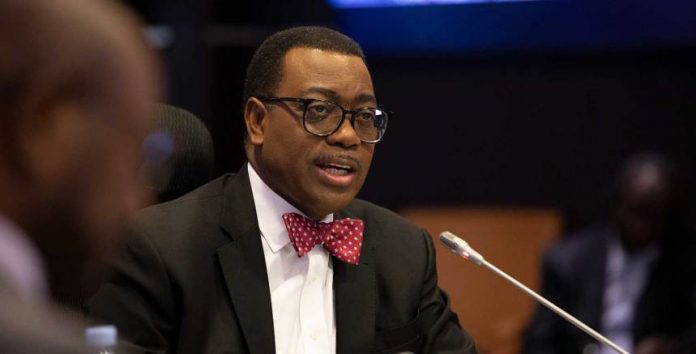Unsurprisingly, Akinwumi Adesina was re-elected as head of the African Development Bank, for a second five-year term. A look back at a personality, a background, and a mandate that will have revived the institution.
Okay, he had known from the start of the year that he wouldn’t have a rival. However, the re-election of Akinwumi Adesina as head of the AfDB (African Development Bank) was not without its pitfalls.
Accused, in the spring, by self-proclaimed “whistleblowers” of a series of favoritism and negligence, he had to undergo the examination of the accusations by the Ethics Committee of the ADB, itself subject to review by an independent commission. Which validated the rejection of the charges. “The past few months have undoubtedly been difficult for the bank,” said “Dr. Adesina” in his opening speech on August 26.
As a result, an election that allowed him to gather 100% of the vote, which had never happened in the history of the ADB, made a point of emphasizing the lucky elected himself. Which thanked the governors of the bank “for choosing continuity and strengthening the institution”.
It is true that Adesina was able, in this particular period experienced by Africa and the world, to bring together all African leaders. During the opening ceremony, Ivorian President Alassane Ouattara explicitly called for the re-election of the AfDB president. This unanimity did not prevent the debates.
Several voices were raised to call for an update of the ethics and governance framework. Last quack: Nigeria’s “maneuvers” to double its voting rights in the Bank’s Board of Governors, just days before the General Assemblies.
Improving governance would be a question of “credibility”, for an institution, however, irreproachable in its action, since the start of the Covid-19 epidemic.
A mandate rich in actions!
Indeed, for several months now, “the AfDB has been providing support to member countries in the region in order to protect their economies, their health systems and the livelihoods of their populations,” the institution welcomes.
In April 2020, the Bank put in place a Covid-19 Rapid Response Mechanism, with a maximum amount of $10 billion, to provide flexible support to sovereign and non-sovereign operations in Africa. As of August 20, $2.29 billion of this mechanism had been approved for member countries of the bank.
An additional $1,186 billion has been disbursed to African Development Fund member countries, and approvals are underway.
In March 2020, the AfDB had already mobilized a record amount of $3 billion during the introduction of its “Fight Covid-19” social bond on the London Stock Exchange.
Despite this difficult period of confinement, the Bank has managed to take some major key steps. International rating agencies Fitch and Standard & Poor’s have confirmed the institution’s AAA rating with a “stable” outlook.
Affable, smiling, famous for his collection of colorful bow ties, the eighth president of the AfDB smoothly shakes up the institution, in order to make it more efficient, showing himself to be uncompromising to his members and to himself.
“The ADB is not a retirement home where you can spend thirty years, we have entered into performance contracts over three years,” he replies to questions concerning Albéric Kacou. The latter, close to Alassane Ouattara, had been “dismissed” bluntly in 2018.
New resources for the future!
No organization can excel at performance without emphasizing accountability for results, he reiterates. This quest for performance, Adesina applies to himself and to his institution. Everyone can judge on an online platform, therefore “in real time”, the progress of the “Five objectives” of the Bank: “Feed, Integrate, Lighten up, Industrialize Africa, Improve the standard of living of Africans.”
Tired of the big international conferences where follow one another of agreed speeches, President Adesina launched the “Forum for investment in Africa”, a meeting platform where firm contracts are tied, where industrial projects take shape.
A new strategy for the AfDB which intends to contribute more, and more directly, to the financing of the private sector. In this regard, one of President Adesina’s great feats of arms is to convince his partners to increase the Bank’s capital, from $93 billion to $200 billion, at the end of 2019.
“Enough to give us a lot of resources to go further in the development of our continent.” With the capital increase, the institution intends to support the Desert to Power initiative which “will provide access to energy for 250 million people throughout the Sahel”.
The AfDB wants to double its portfolio of climate-related projects to $25 billion by 2025 and support infrastructure – such as the Abidjan-Lagos highway, not to mention support for the African Continental Free Trade Area.
An “arrogant prodigy”!
Akinwumi Adesina was born in southwestern Nigeria, into a modest farming family; her father, legend has it, earned barely $ 0.1 a day. We immediately understand his constant interest in agriculture! Pierre Guislain, vice-president of the AfDB, relates “his extraordinary knowledge of the challenges, the stakes, the possibilities” of the agricultural field, which Adesina always speaks “with emotion”.
Victor Oladokun, ADB communications director, remembers a rather cold first contact with this student who was “arrogant” after having severely beaten him … at badminton! Despite this bad first impression, whoever becomes one of Adesina’s warmest supporters will soon see “a wonder, of exceptional mental and physical endurance.”
Akinwumi Adesina lived in around fifteen African countries, particularly French-speaking ones, before heading the AfDB, in fields as diverse as financial development, agriculture, the rural world, strategic public policies, research, mobilization. investment and resources and the development of public-private partnerships.
For four years (2011-2015), he was Nigeria’s Minister of Agriculture and Rural Development. In a country whose main resource remains oil, he was able to convince of the merits of a green revolution.
In Nigeria, it will halve food imports, creating three million jobs. He modernized his country’s agriculture, including the introduction of the electronic wallet that directly informs and supplies farmers with subsidized agricultural inputs, bypassing sometimes unscrupulous middlemen.
To better feed Africans!
This system has reached 14.5 million farmers, mainly benefiting women. Since then, Adesina has been educated in many countries, including China, Brazil and India, not to mention Africa, Kenya, Uganda and the Ivory Coast. Prior to this ministerial post, he was vice-president of the Alliance for a Green Revolution in Africa (AGRA) which allocated some $4 billion to African agriculture.
Our man, author of dozens of academic books, has received numerous international awards, often linked to his work in development and agriculture. The most recent is not the least prestigious: in 2017, he received the Word Food Prize in New York, which recognizes his efforts in the direction of agriculture.
A consecration for those who intend to “feed all Africans better”. Also, he considers essential the search for agricultural self-sufficiency, “if Africa wants to eventually eliminate the 35 billion dollars spent each year to import the food products it lacks”. The AfDB has launched a ten-year, $24 billion program to support Africans in their “Green Revolution”.
Her career has been enriched by a notable stint (1998-2008) at the Rockefeller Foundation where he initiated programs to develop economic opportunities for African women farmers and to improve education and training systems.
The loyal Victor Oladokun portrays a “soul of a leader” who enables him to make decisions “not necessarily well accepted at first” when they upset the established order. Indeed, the ADB is a discreet institution, where actions are decided softly. Not necessarily the temperament of Adesina, who some criticize her taste for the spotlight.
Insufficient criticism, so far, to destabilize him and question his leadership …


































